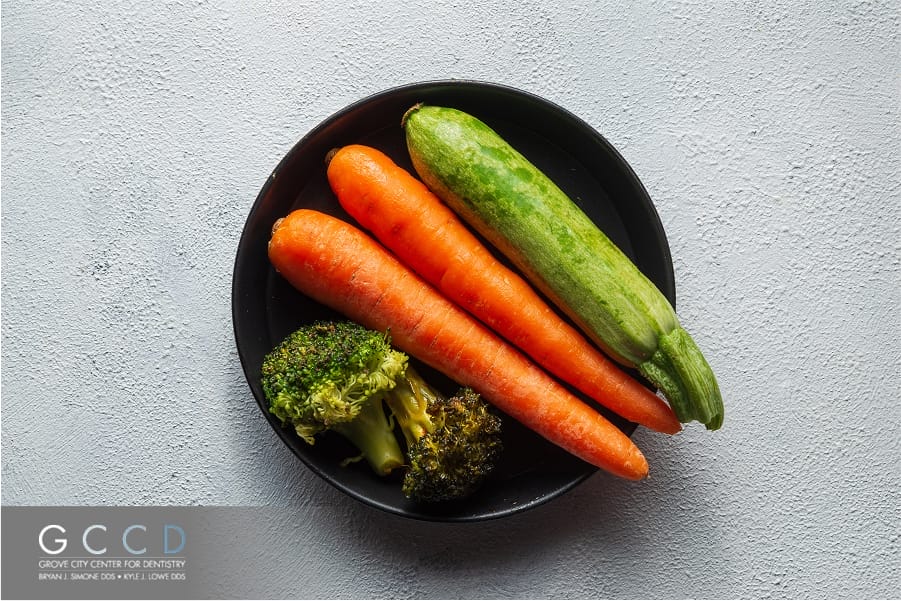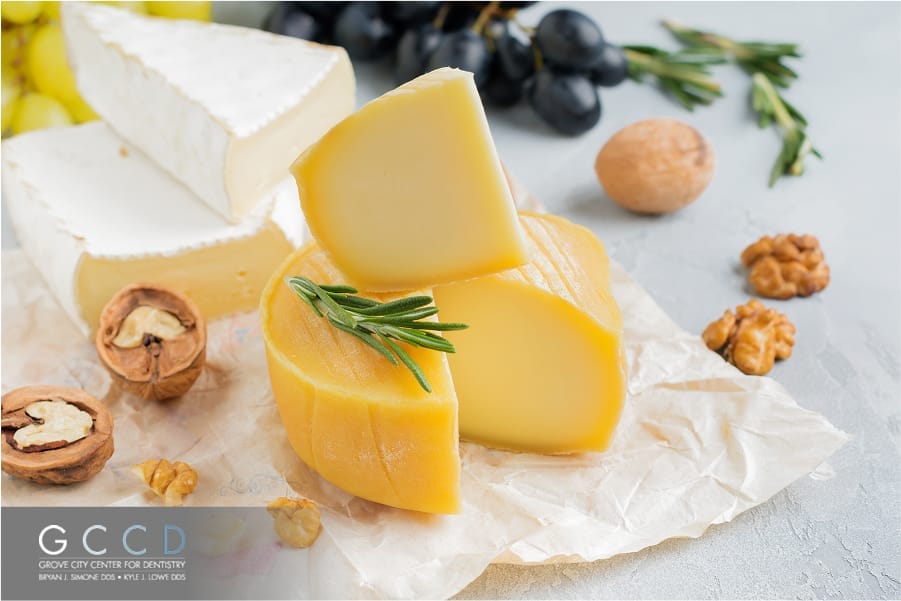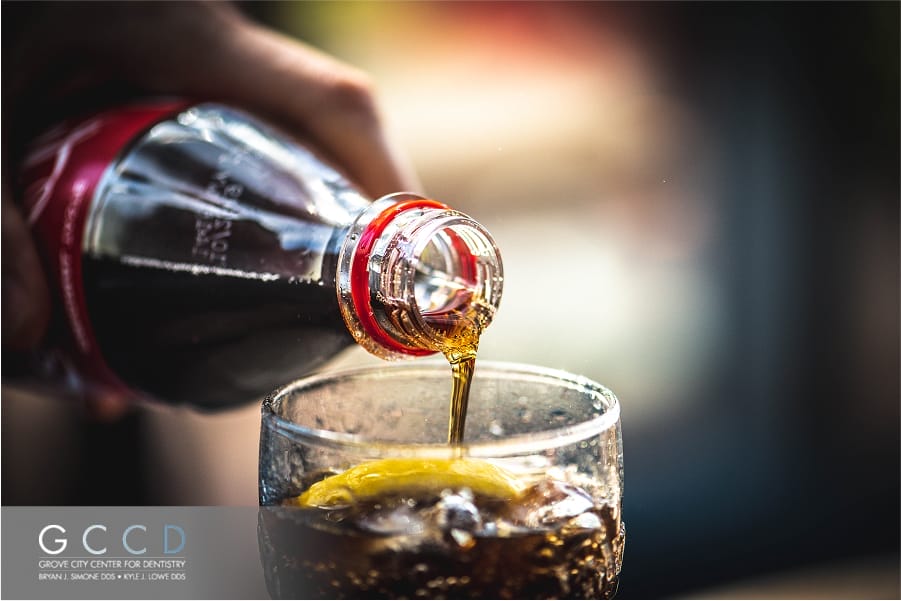Your diet impacts far more than just your waistline—it can make or break your smile too. While most of us know that sugary foods aren’t great for our teeth, the relationship between what you eat and your dental health goes much deeper than just avoiding candy. Some foods actually work like natural cleaners and strengtheners, while others might as well be throwing a party for cavity-causing bacteria.
Today, we’re breaking down the superstars and troublemakers of the food world when it comes to your dental health. Let’s dive into 5 foods that will make your dentist proud (and 5 that might have you scheduling an extra cleaning).

Crunchy Vegetables (GOOD)
Ever notice how clean your teeth feel after munching on raw carrots or celery? That’s no coincidence! Crunchy vegetables work like natural toothbrushes, scrubbing away food particles and plaque as you chew. Their high water content also stimulates saliva production, your mouth’s built-in cleaning system that washes away bacteria and food debris. Plus, the fibrous texture of veggies like carrots, celery, and cucumbers gives your gums a gentle massage, improving circulation and keeping them healthy.
Sticky Sweets (BAD)
We all love a good caramel or gummy bear now and then, but your teeth? Not so much. Sticky candies and sweets are particularly problematic because they cling to your teeth long after you’ve enjoyed that momentary sweetness. This extended sugar exposure gives bacteria plenty of time to feast, producing acids that attack your enamel. What makes these treats especially dangerous is how they wedge into grooves and between teeth where even your toothbrush struggles to reach. Your dentist can spot a gummy bear enthusiast from a mile away!

Cheese (GOOD)
Good news for cheese lovers—your favorite snack is actually fighting the good fight for your dental health! Cheese raises the pH level in your mouth, creating an environment that’s less favorable for cavity-causing bacteria. It’s rich in calcium and phosphates that help remineralize tooth enamel, essentially strengthening your teeth with every delicious bite. Research has even shown that eating cheese after meals can help neutralize acids from other foods. So go ahead and enjoy that cheese board—your teeth will thank you!
Citrus Fruits (BAD)
That refreshing orange or grapefruit might wake up your taste buds, but it’s also giving your enamel a rough time. Citrus fruits contain acids that can gradually wear away tooth enamel, especially if you consume them frequently or sip citrus juices slowly throughout the day. Over time, this acid exposure can lead to sensitivity, discoloration, and increased vulnerability to decay. This doesn’t mean you should avoid vitamin C-rich foods altogether—just be mindful about rinsing with water afterward and waiting at least 30 minutes before brushing (immediate brushing can actually push the acids deeper into enamel).
Leafy Greens (GOOD)
Kale, spinach, and their leafy cousins aren’t just nutritional powerhouses for your body—they’re superstars for your smile, too! These greens are packed with calcium, which builds your teeth’s enamel, and folic acid, which has been shown to help with gum health.
They’re also high in fiber, requiring serious chewing that stimulates saliva production to naturally clean your teeth. If you’re not a fan of salads, try sneaking these dental defenders into smoothies, omelets, or pasta dishes—your teeth will never know the difference!

Carbonated Beverages (BAD)
That satisfying fizz in your favorite soda comes with a hidden cost to your dental health. Carbonated drinks—even sugar-free varieties—contain phosphoric and carbonic acids that erode tooth enamel over time. When you add sugar to the mix (with regular sodas containing up to 11 teaspoons per can), you’re essentially bathing your teeth in an acid-sugar solution perfect for causing decay. What’s particularly troubling is how many people sip these beverages throughout the day, giving their teeth no time to recover from the acid attacks. If you can’t give up your bubbly fix completely, using a straw can help minimize contact with your teeth.
Nuts (GOOD)
Here’s a snack you can really sink your teeth into—literally! Nuts like almonds, cashews, and walnuts provide multiple benefits for your dental health. Their crunchy texture stimulates saliva flow while their gentle abrasiveness helps remove plaque buildup.
Nuts are also packed with beneficial nutrients like calcium and phosphorus that strengthen teeth, plus proteins and healthy fats that support gum health. Almonds are particularly dental-friendly, containing low sugar content while being high in calcium and protein. Keep a small container of unsalted nuts handy for a tooth-healthy snack that satisfies without sabotaging your smile.

Dried Fruits (BAD)
Those innocent-looking raisins, dried apricots, and other dried fruits might seem like healthy alternatives to candy, but they’re hiding a dental health secret. When fruits are dried, their sugars become highly concentrated, and their texture transforms into a sticky consistency that clings tenaciously to teeth. This combination creates the perfect storm for cavities—sugar that adheres to teeth for extended periods, feeding bacteria in hard-to-clean areas.
Here are some better options:
- Fresh fruits with high water content like apples or pears
- Freeze-dried fruits that retain a crisp texture rather than sticky
- Limiting dried fruit consumption to mealtimes when increased saliva helps clean teeth
If you do enjoy dried fruits, a thorough rinse with water afterward can help minimize their dental impact.
Green and Black Tea (GOOD)
Your daily cup of tea does more than just wake you up—it’s actively fighting to protect your smile! Both green and black teas contain compounds called polyphenols that help fight bacteria and reduce inflammation, potentially slowing the growth of bacteria associated with cavities and gum disease. Teas naturally contain fluoride, which helps strengthen tooth enamel and make it more resistant to acid attacks. Research has shown that regular tea drinkers have less dental plaque and a lower risk of tooth loss compared to those who don’t enjoy this beverage. For maximum benefits, try drinking your tea unsweetened—adding sugar defeats much of the purpose!
Ice Chewing (BAD)
Heres the cold, hard truth about ice chewing: it’s actually a dental disaster waiting to happen. Ice is incredibly hard—it needs to be to withstand melting—and repeatedly chewing it puts enormous pressure on your teeth. This can lead to cracked or chipped teeth, damaged enamel, and problems with existing dental work like fillings and crowns. Interestingly, compulsive ice chewing (called pagophagia) is sometimes linked to iron deficiency anemia, so if you find yourself unable to resist the urge, it might be worth mentioning to your doctor. If you’re just after that satisfying crunch, try substituting with crisp vegetables that clean your teeth instead of endangering them.
The Bottom Line for Your Bottom Teeth (And the Top Ones Too!)
Your diet plays a crucial role in maintaining that healthy smile between dental visits. While no single food will make or break your dental health, consistently choosing tooth-friendly options can make a real difference over time.
Remember, even the healthiest diet isn’t a substitute for regular brushing, flossing, and professional cleanings. Think of good food choices as your dental health allies, working alongside proper hygiene to keep your smile brilliant.









